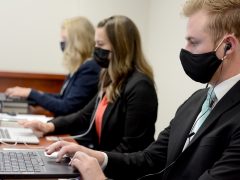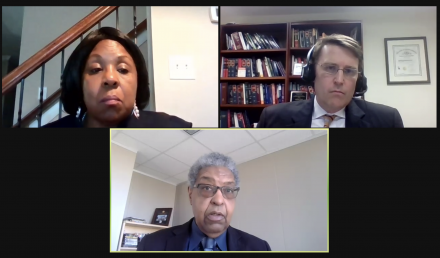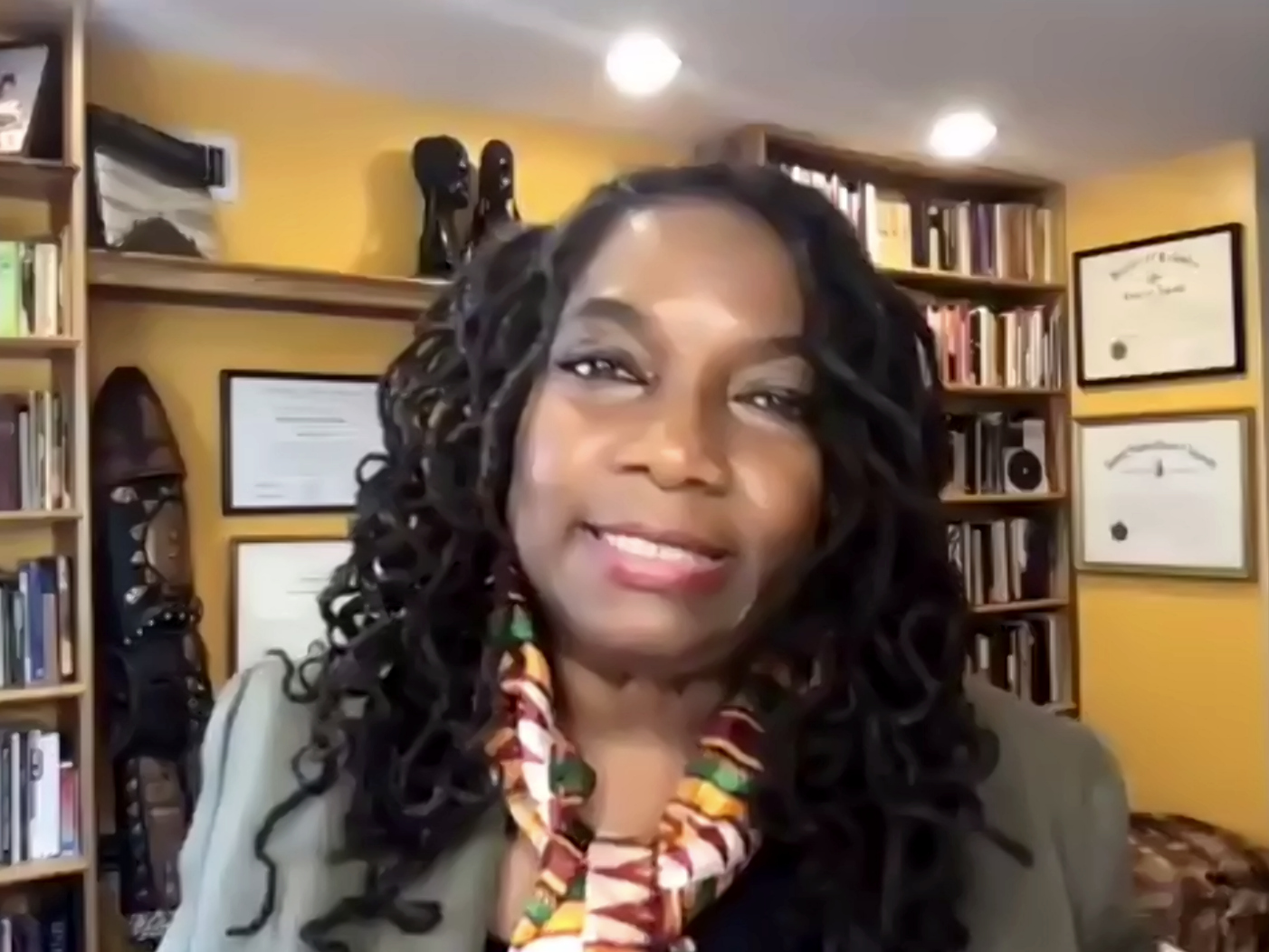An annual program hosted by the Elon Law Review invited legal scholars and advocates to share historical perspectives and critiques of various proposals that would provide compensation to descendants of those enslaved in the United States.
Nkechi Taifa wants to make something clear: Reparations to descendants of those once enslaved in the United States aren’t “handouts” and they certainly aren’t “welfare.”
As the Washington attorney and founder of a prominent social enterprise firm explains, reparations are a well-established principle of both international as well as domestic law. “It is,” she says, “payment for a debt owed.”
And the debt owed due to slavery in the United States is one that transcends multiple generations, Taifa said in a keynote address to attendees of the Elon Law Review’s 2021 Symposium with the theme of “Reparations: Restorative Justice for Racial Disparities”.

Slavery is a crime against humanity, Taifa said. Families were destroyed, with bodies beaten and raped through the terror required of slave owners to maintain their economic system. Nor did its impact end with the South’s surrender in the Civil War, she said. For many years afterward, governments enacted “separate but equal” laws while local populations waged violence against prosperous Black communities and extrajudicial lynchings instilled fear across the South.
Even today, Taifa said, there are restrictions on voting that are being passed by state legislatures who know the new policies disproportionately impact communities of color. Disparate harm likewise remains in health care, housing, and the criminal justice system.
“The nation can reconcile the contradictions created by the Founders by stopping the false narrative that slavery ended over a century ago and, as such, nothing is due,” Taifa said. “Reparations must be paid now because it is owed. Had it been before there would be no debt now.”
True reparations require four essential elements, Taifa said.
- The formal acknowledgement of a historical wrong and an official, unfettered apology.
- Recognition that the injury has continued and manifests itself today.
- A commitment to redress the harms caused by the wrong.
- Actual compensation in whatever form or forms are negotiated in a settlement agreement with those who were harmed. Reparations are “not something that the culpable party dictates from on high.”
And what forms could reparations take? Financial compensation. Land. Economic development. Truthful textbooks. Erection of monuments and museums. The list goes on. “Reparations are not history,” Taifa said. “It’s not a thing about the past. It is about historical justice. And until justice is done, reparations will always be relevant, and they will always be a righteous struggle.”
Taifa founded The Taifa Group, LLC, in Washington where she oversees a portfolio of client services that include coalition-building, convenings, government relations, meeting and retreat facilitation, strategic planning, and training workshops.
She is a Senior Fellow at Columbia University’s Center for Justice and convenes the Justice Roundtable, an advocacy coalition advancing progressive justice system transformation. Taifa has testified before Congress and the United States Sentencing Commission, among other governing bodies, and is a founding member of N’COBRA, the National Coalition of Blacks for Reparations in America.
Taifa serves as a commissioner on the National African American Reparations Commission and on the governing board of the Corrections Information Council.
The symposium on September 24, 2021, was the second in as many years to be organized in a virtual format by the Elon Law Review. More than 250 people registered in advance, making it the largest Elon Law Review program in the publication’s history. The program counted toward 4.0 CLE hours through the North Carolina State Bar.
Taifa delivered her remarks as part of a named lecture honoring the late Michael Rich, a nationally recognized scholar of criminal law who died of cancer in 2016 while serving as the Jennings Professor and Emerging Scholar at Elon Law. Assistant Professor Tiffany Atkins L’11 introduced Taifa and moderated questions from attendees after the end of formal remarks.
The Elon Law Review was established in 2008 as the student-run and student-edited scholarly journal of the Elon University School of Law. With each issue, the Elon Law Review strives to advance legal education and scholarship through the contribution of intelligent discussion and analysis of the law.
In addition to publishing an annual issue that examines novel and significant topics of legal scholarship, the Elon Law Review hosts a yearly symposium on an emerging topic in the legal community.
Additional panel discussions at the 2021 Symposium

“Reparations Through Legal & Economic Lenses”
- Wendy B. Scott, Associate Dean for Academic Success and Professor of Law, Elon University School of Law
- William Darity, Jr., Professor of Public Policy, Duke University
Moderated by Professor Andy Haile
“The Past & Future of Reparations: The Wilmington Massacre & Administrative Reparations”
- Sandra L. Rierson, Visiting Professor of Law, California Western School of Law
- Melanie Schwimmer, Amherst College Class of 2023
- Vanessa Zboreak, Assistant Professor of Law, Elon University School of Law
Moderated by Professor Catherine Dunham
“Global and National Issues: From Caribbean Community Reparations to Tulsa”
- Robert St. Martin Westley, Professor, Tulane University School of Law
- Anthony Ashton, Director of Affirmative Litigation for NAACP
Moderated by Visiting Assistant Professor Chrystal Clodomir
Reflections from the Elon Law Review
“We are so thankful and appreciative of all the participants and attendees for this year’s Symposium. One of my favorite parts of the Symposium was learning the different avenues through which scholars believe reparations could be implemented. It was an excellent diffusion of scholarship on an extremely important topic.” – Samuel Luchansky L’21, Chief Symposium Editor
“It was an honor to be part of the process of bringing so many leaders in the field of legal reparations to the Elon Law community for the symposium. Our team was energized about the topic since it was first proposed by Dean Scott. I am especially grateful for the platform Elon University School of Law continues to provide, through the Symposium, to empower students to engage in relevant and meaningful legal discussions.” – Valerie Lott L’21, Symposium Co-Editor
“Sam, Valerie, and I put a lot of time and effort into this symposium, and we were thrilled with the result. We tried to offer varying ideas and perspectives, so I hope that people were able to walk away both intrigued and inspired to learn and do more. What we really wanted to do was spark interest and encourage thoughtful conversation because there is still a lot of work that needs to be done in the area of reparations. I am happy that Elon Law allowed us to take this idea and run with it, and I hope that this Symposium is one that people will remember.” –Jessica Leach L’21, Symposium Co-Editor



